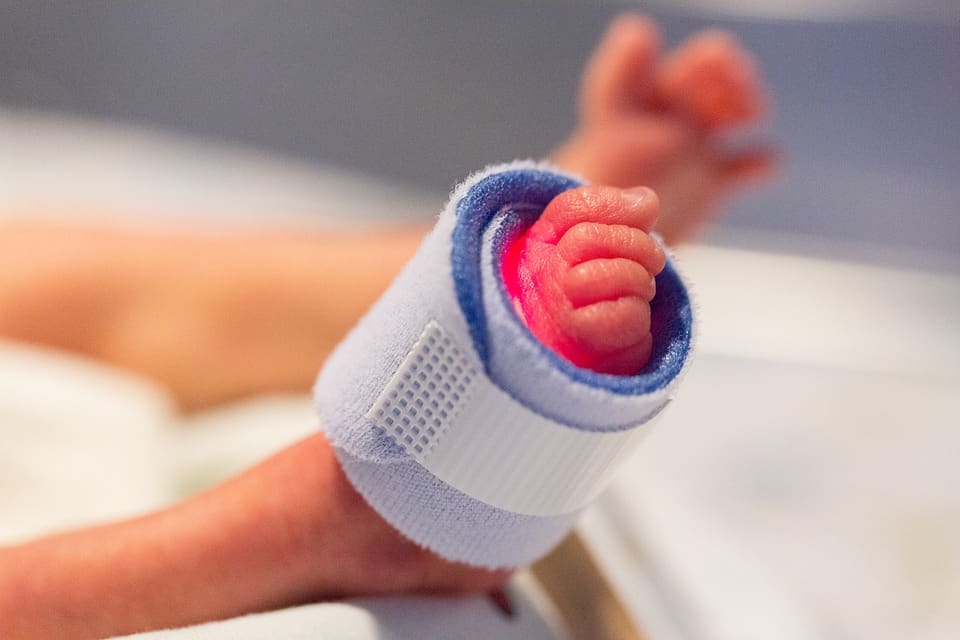Parents and nannies need support when caring for a preemie. Premature babies (or preemies) are those babies born before 37 weeks of gestation. A micro-preemie is a baby who is born weighing less than 1 pound, 12 ounces (800 grams) or before 26 weeks gestation. Since preemies are born before they reach their full gestation period, they need special care in the hospital.
Most hospitals have a Pediatric Intensive Care Unit or PICU that specializes in the care of critically ill infants, children, and teenagers. Preemies are often delivered or transported to a hospital with specialized units equipped and staffed to provide intensive care to dangerously ill or premature newborn babies. These Neonatal Intensive Care Units (or NICUs) may provide short- or long-term care. It all depends on the preemies’ needs. Some preemies thrive and quickly ‘graduate’ from the NICU to be sent home. Others may require extended care in the unit.
Going Home
Before being discharged from the hospital, a preemie must meet several basic requirements. These requirements ensure good health and fewer medical problems. Some nurseries require a minimum weight for discharge, but more often, the NICU staff will evaluate the baby on these three criteria:
- Can the baby maintain body temperature in an open crib for at least 24-48 hours, depending on how premature the baby was at birth?
- Can the baby take all feedings by bottle or breast without supplemental tube feedings?
- Can the baby gain weight steadily?
Most preemies meet these criteria 2 to 4 weeks before reaching their original due date. Infants who have had surgery, were born with health problems or who spent weeks on breathing machines and oxygen are the most likely to stay beyond their original due date.
Health Challenges
Many preemies do not need specialized medical support after leaving the hospital. However, all preemies will need regular medical care and evaluation. Common medical problems for premature babies include apnea, feeding issues and infection. Premature infants commonly have episodes of apnea, or pauses in breathing, which improves as they mature. Babies will not be discharged if the apnea causes a slow heart rate or a change in color. Some nurseries send infants home on apnea monitors if the infants have mild apnea. The apnea can’t cause a change in color or heart rate or require stimulation to make the baby breathe again. Other nurseries may monitor preemies until the breathing pattern reaches maturity, usually at about 44 weeks’ post-conceptional age.
Preemies may have breathing problems and need supplemental (extra) oxygen or a mechanical ventilator. Most recover and do not require supplemental oxygen by the time they graduate from the NICU. However, some develop a more chronic lung condition called bronchopulmonary dysplasia, which involves scarring and irritation in the lungs. Infants with BPD may need supplemental oxygen and medicines for long periods even after discharge. They can be sent home on oxygen or medications to help their lungs work better.
Additional Nutrition
Premature infants need more nourishment because they must catch up to the growth of full-term babies. It is important not to feed them too aggressively because their intestines are not fully mature. The baby will be discharged with a feeding plan specific to his or her needs. This may include more feedings of less volume or the preemie may need more concentrated milk to grow well. Some premature babies can have problems coordinating sucking, swallowing, and breathing during feeding. The preemies may temporarily be fed with a nasogastric tube, or NG tube (a tube that passes through the nose to the stomach). Another option is a gastrostomy tube, or G tube (tube surgically inserted through the skin that goes directly to the stomach). Neonatal specialists may also recommend specific types of formula for preemies.
Like other body systems, the immune system of a premature infant does not work as well as that of older kids or adults. This places preemies at risk for getting infections (especially viral ones) after discharge. Typically, medically stable preemies receive vaccines according to doctor-recommended schedules while they are in the NICU. It’s important to ensure that all household members and people who will be in close contact with the baby are up to date on their pertussis immunization (through the Tdap vaccination shot) and have received their seasonal flu vaccine. Although many different viruses can infect preemies, they are particularly vulnerable to the respiratory syncytial virus (RSV), a common viral infection in young kids that is often mistaken for a cold or the flu. Although RSV causes few problems in adults and older kids, in preemies it can lead to severe illness, breathing problems, or even death, and is a common cause for rehospitalization of preemies. Preventive medicine is available to help protect infants from RSV. Preemies born at less than 29 weeks should receive this medicine, as well as any born under 32 weeks who required extra oxygen for the first month of life.
Nannies interested in caring for preemies are encouraged to get additional training in newborn care, offered online by the Nanny Institute.


Recent Comments